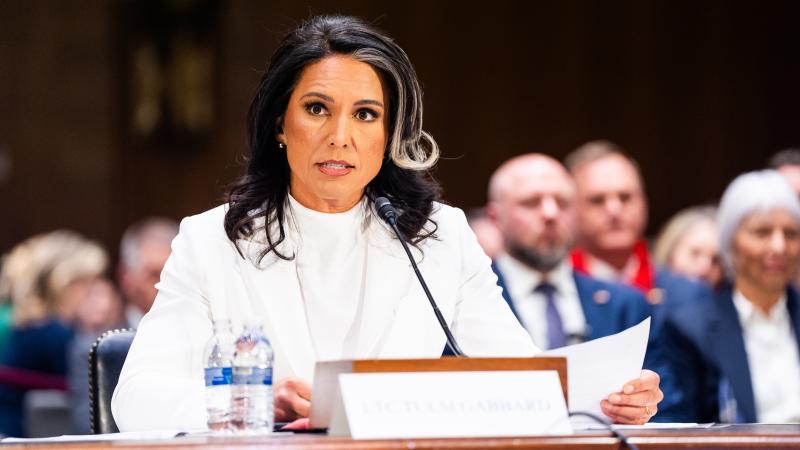Medical schools risk accreditation for not teaching antiracism 'competencies,' med group warns
Competencies will make it harder for med students and faculty to "voice support for a meritocracy or skepticism toward 'gender-affirming care' for minors," academic freedom group says.
Under new curriculum standards, or "competencies," from the influential Association of American Medical Colleges, medical schools could be required to teach students to identify "systems of power, privilege, and oppression" — systems like white privilege, "heterosexism" and ableism — "and their impacts on health outcomes."
If implemented, the standards could require students to practice "anti-racism and critical consciousness in health care" and describe how "colonization, White supremacy, acculturation, [and] assimilation" affect health.
The diversity, equity and inclusion (DEI) competencies, published in an AAMC report earlier this month, say that students should be "advocating" for equity, inclusive practices and a "diverse health care team."
AAMC cosponsors the Liaison Committee on Medical Education (LCME), the accrediting body for medical school programs, with the American Medical Association. The two published a "health equity" report last fall that called for politically correct changes to medical language, such as replacing "vulnerable" with "oppressed."
"The AAMC will likely push to require this teaching through accreditation ... and then test students for it via the MCAT (which it administers)," medical advocacy group Do No Harm, incorporated this year to fight "woke activists" in healthcare, said Friday
While the report claims the competencies are "not intended for high-stakes assessment or for purposes of accreditation," Do No Harm Chairman Stanley Goldfarb told Just the News this was not a credible claim.
Just by invoking competences, AAMC is making clear to medical schools they'll be grilled in accreditation visits on how they are training med students in antiracism activities, said Goldfarb, a professor and former associate dean of instruction in the University of Pennsylvania School of Medicine.
Even if schools have a "fair amount of latitude" to implement the competencies, they would still have to use the "particular methodologies" of antiracism and teach through the lens of oppression, according to Goldfarb. "Depending on how they're implemented, they can be very discriminatory," he warned.
Opponents in more conservative states should contact lawmakers and education boards that govern public universities to push back on the competencies through law or regulation, he said.
The right-leaning National Association of Scholars obtained a pre-publication version of the competencies in March, warning that they would "establish social justice activism, along with a controversial set of political beliefs, as de facto professional requirements for students and faculty."
"Mandatory or not," NAS research fellow John Sailer warned last week, the competencies will make it harder for students and faculty at med schools that adopt them to "voice support for a meritocracy or skepticism toward 'gender-affirming care' for minors."
AAMC is featuring Princeton's Robert George, an eminent conservative intellectual, at its annual meeting in November. He and Princeton emeritus professor Cornel West will be speaking on "civil discourse, academic freedom, open inquiry, and intellectual diversity" in a discussion moderated by AAMC President David Skorton.
George told Just the News he wasn't familiar with the DEI competencies, which were published after he and West agreed to speak at the meeting. If they are pertinent, "I will certainly not consider them out of bounds for discussion," he said.
The report summary page offers little idea what the competencies entail. To read the 36-page report, users must create an AAMC account by answering several personal questions and creating "security questions," add the free report to their cart in the AAMC store, and then "purchase" it.
The report justifies the competencies by citing centuries-long "systemic health and health care inequities grounded in racism, sexism, homophobia, classism, and other forms of discrimination" and the "broad societal calls for social justice and the disparate impacts of the COVID-19 pandemic."
Even while disavowing the competencies for accreditation or testing requirements, the report invokes previous accreditation requirements for "cultural competence," "health care disparities" and equity from the LCME, Accreditation Council for Graduate Medical Education and Accreditation Council for Continuing Medical Education.
It complains that "medical schools and residency programs approach preparing students for culturally responsive care in variable and siloed ways" and calls for "further work ... to align DEI efforts across the continuum" in conjunction with efforts "by accrediting and certification bodies."
AAMC media research specialist Bryson Wilson told Just the News Friday that media relations couldn't answer questions until Monday about the competencies and why the report requires registration to read.
The competencies could raise First Amendment issues if applied in taxpayer-funded medical schools. The Indiana University School of Medicine recently approved a DEI requirement for faculty as a condition of tenure and promotion, prompting legal warnings.
The proposed requirement would "compel participation in and allegiance to a belief system" and violate IUSM's academic freedom promises," Goldfarb told IUSM's Faculty Steering Committee in May. It would, he added, "incentivize faculty to engage in racial discrimination in who they hire, promote, mentor, and to whom they provide scholarships and grants."
Do No Harm is in contact with various state lawmakers and attorneys general about such faculty requirements, Goldfarb told Just the News. "The question here is meritocracy versus diversity," he said.
Last week, the group shared an IUSM administrator's email "requesting" faculty and staff leaders "spend a minimum of 2 hours on DEI focused professional development throughout the 2022 calendar year," with classes such as "allyship and anti-racism" and fostering "inclusive language at work."
IUSM's DEI requirement "coerces faculty whose academic interests may lie elsewhere … to substantially reorient their scholarly pursuits or administrative service to conform with IUSM's ideological preferences," the Foundation for Individual Rights and Expression wrote to Dean Jay Hess July 11.
It also "selectively reward[s] faculty who engage in DEI-related activism," FIRE said. The med school didn't respond to Just the News queries for its response to the warnings.
Public universities cannot constitutionally use the AAMC competencies to "require students or faculty to endorse disputed assumptions about race, social dynamics, health care disparities, and other issues, or to engage in specific forms of social justice activism," Aaron Terr, senior program officer for campus rights advocacy at FIRE, told Just the News.
Private universities "committed to free speech and academic freedom" should not do so either, he added. "Anyone can see the danger in medical schools filtering out competent future doctors or medical researchers because they are insufficiently committed to some ideological cause."
The Facts Inside Our Reporter's Notebook
Documents
Links
- characterized white women as "birthing persons"
- "health equity" report
- incorporated this year to fight "woke activists" in healthcare
- pre-publication version of the competencies
- NAS research fellow John Sailer warned
- annual meeting in November
- "civil discourse, academic freedom, open inquiry, and intellectual diversity
- report summary page
- 36-page report
- Indiana University School of Medicine recently approved a DEI requirement
- Goldfarb told IUSM's Faculty Steering Committee
- IUSM administrator's email
- Foundation for Individual Rights and Expression wrote to Dean Jay Hess July 11
















